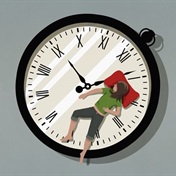- A decent night's sleep is incredibly important for your health, and researchers have recently found that it cannot be replaced by rest
- They conducted a study involving three groups of participants and explain that sleep-specific brain activity restores performance – something rest is unable to do
- If you're struggling with getting deep sleep during the Covid-19 pandemic, you're not alone, but there are some tips to help you
After a bad night’s sleep, most of us are not in the best of moods the next day. And if you’ve tried resting during the course of the day without feeling better, it’s simply because sleep is irreplaceable for the recovery of your brain.
These are the findings of researchers at the Medical Center, University of Freiburg, Germany, who have shown that sleep is more important than rest for improving performance.
"Sleep is irreplaceable for the recovery of the brain. It cannot be replaced by periods of rest for improved performance,” said lead researcher Professor Christoph Nissen, who is now working at the University of Bern, Switzerland.
“The state of the brain during sleep is unique," he added.
The findings were published in the peer-reviewed journal Sleep, and provide vital information for planning periods of intensive learning or training.
Conducting a study: three groups of participants
The research team conducted a visual learning experiment involving 66 participants.
One group stayed awake watching videos or playing table tennis. The second group slept for one hour, while the third group stayed awake, but was placed in a darkened room without external stimuli.
Sleep group performed best
The group that slept was found to perform significantly better than the group that was awake and active.
The sleep group also performed significantly better than the group that was awake, but deprived of any external stimuli, the authors wrote. The improvement in performance was linked to typical deep-sleep activity of the brain, they explained, which has an important function for the connectivity of nerve cells.
"This shows that it is sleep itself that makes the difference," said study co-leader Professor Dieter Riemann, head of the sleep laboratory at the Department of Psychiatry and Psychotherapy at the Medical Center – University of Freiburg.
Sleep-specific brain activity restores performance and can therefore not be replaced by rest during phases of intensive performance demands at work or in everyday life, the researchers concluded.
Battling to sleep at night?
The Covid-19 pandemic has upended our lives in many ways and, in many cases, has impacted our quality of sleep, even caused terrifying dreams. For example, Health24 previously reported on a study that found that the Covid crisis is causing anxiety and upsetting dreams in many people.
Normal sleep is made up of two main phases – non-rapid eye movement (NREM) and rapid eye movement (REM) sleep. The latter is a mode of deep sleep that is important to our sleep cycle as it stimulates the areas of our brain and is associated with improved emotion regulation, memory consolidation, and creative problem-solving, among other factors.
Three tips for sleeping better at night
Keep electronic devices away from your bed: The light emitted from electronic devices, such as your smartphone, has a higher concentration of blue light than natural light. Blue light has been found to reduce the level of melatonin, also known as the sleep hormone, that promotes healthy sleep. As this Health24 article explains, it tricks your body into believing it is daytime, making it difficult for you to fall asleep.
Consider meditation: Research shows that meditating early in the day can help us sleep better at night and can also help reduce cortisol, the hormone associated with stress. There's a range of meditation techniques, explained in this Health24 article.
Limit your alcohol and caffeine intake before bed: According to this Health24 article, alcohol has been found to reduce REM sleep. Having caffeine a couple of hours before bed may also cause you to sleep less soundly and disrupt the REM stage of your sleep cycle.
READ | An expert's guide to keeping bad dreams at bay
READ | 5 practical tips for sleeping better
READ | The Covid-19 pandemic is causing anxious, upsetting dreams in many people, especially women




 Publications
Publications
 Partners
Partners












